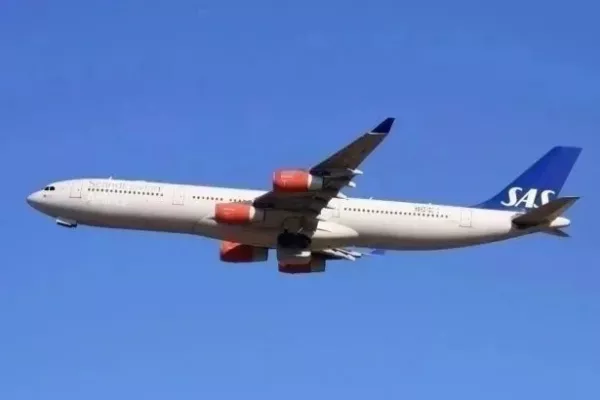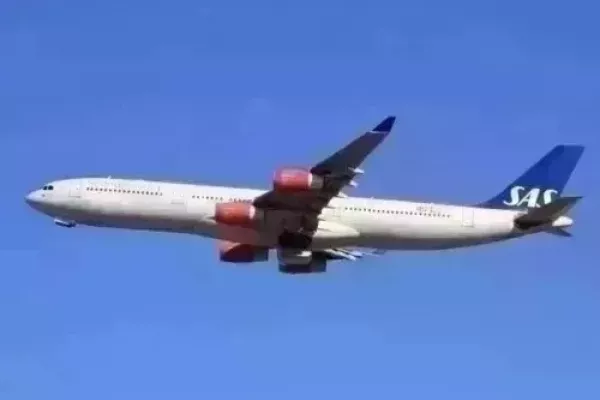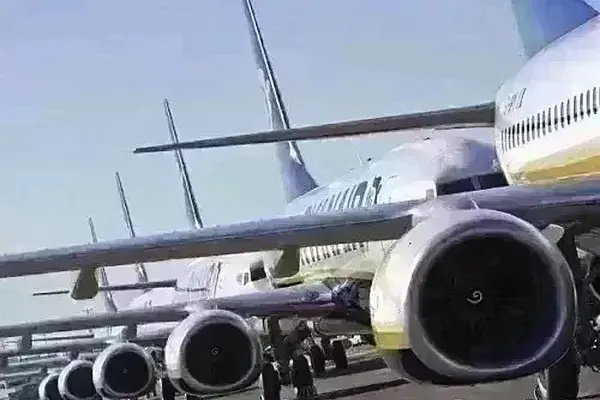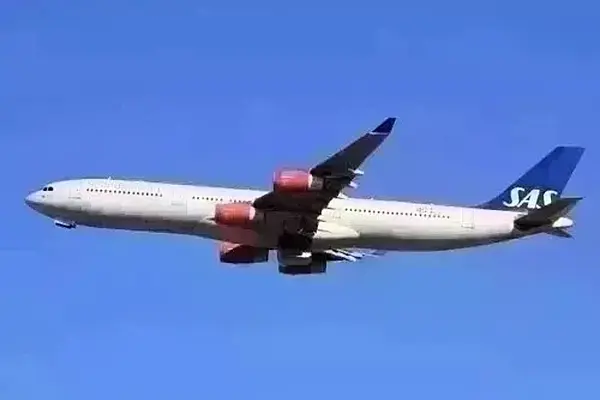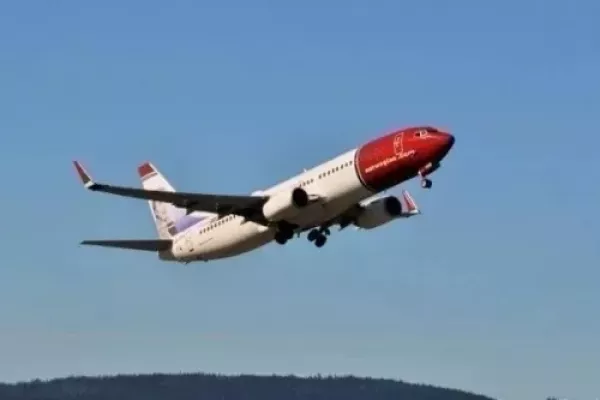Scandinavian airline SAS SAS.ST has filed for bankruptcy protection in the United States to help cut debt, it said on Tuesday 5 July, warning strike action by pilots had deepened its financial crisis.
Wage talks between SAS and its pilots collapsed on Monday, triggering a strike that adds to travel chaos across Europe as the peak summer vacation travelling season shifts into full gear for the first time since the COVID-19 pandemic struck.
That accelerated the airline's decision to file for Chapter 11 bankruptcy protection in the United States, its chief executive, Anko van der Werff, said, as it sought breathing space to carry out restructuring plans.
"SAS aims to reach agreements with key stakeholders, restructure the company's debt obligations, reconfigure its aircraft fleet, and emerge with a significant capital injection," it said.
The company said in its court filing the strike would cost it $10 million to $13 million per day, while a Sydbank analyst estimated in a worst-case scenario it could erase up to half of its cash flow in the initial four to five weeks alone.
SAS said discussions with lenders regarding another $700 million of financing were "well advanced".
It said it would continue to serve its customers throughout the bankruptcy process, although the strike is grounding roughly half the airline's flights, affecting some 30,000 passengers per day.
Data from flight tracking website FlightAware showed 232 SAS flights - 77% of those scheduled - had been cancelled on Tuesday 5 July, while Oslo's Gardermoen airport, one of SAS' hubs, had the world’s highest cancellation rate on the day.
The airline, whose biggest owners are the Swedish and the Danish states, said the bankruptcy protection filing was aimed at accelerating a restructuring plan announced in February.
It expects to complete the Chapter 11 process in nine to 12 months, it added. SAS shares, which can be traded as normal during the bankruptcy proceedings, were down 14% at 1019 GMT on Tuesday 5 July.
COSTS TOO HIGH
Wallenberg Investments, SAS's third biggest shareholder with a 3.4% stake, said it supported the decision and would allow for talks to continue to attain a level of costs and debts that made the airline competitive.
"For decades, SAS has had too-high costs and too-low productivity compared to its rivals," it said.
SAS needs to attract new investors and has said to do that it must slash costs across the company, including for leased planes that stand idle because of closed Russian airspace and a slow recovery in Asia.
Its finance chief Erno Hilden said in the court filing the airline had so far been unable renegotiate lease terms, many of which it said were "significantly above" market rates.
In terms of debt, SAS had three bonds outstanding SE0010520338=, SE0014957999=, SE0012193910= with a total face value of 5.4 billion Swedish crowns ($519 million). They now trade at deeply distressed levels of around one third of face value.
The airline predicted its cash balance of 7.8 billion Swedish crowns was sufficient to meet its business obligations in the near term.
It added however that the strike "has a negative impact on the liquidity and financial position of the company and, if prolonged, such impact could become material".
Sweden's government has said no to injecting more cash into the carrier, while Copenhagen has said it may do so if SAS is able attract new investors.
Nordnet analyst Per Hansen said the application showed SAS needs a fresh start and that it thinks the strike will drag on.
"Chapter 11 protection comes early," he said. "Management and the board want to make it absolutely clear for all stakeholders that the situation is very serious."
Airline SAS Says Survival At Stake As Pilot Strike Grounds Flights
The above news followed news that wage talks between Scandinavian airline SAS SAS.ST and its pilots collapsed on Monday 4 July, triggering a strike that puts the future of the carrier at risk and adds to travel chaos across Europe as the peak summer vacation period begins.
The action is the first major airline strike to hit when the industry is seeking to capitalise on the first full rebound in leisure travel following the pandemic.
It follows months of acrimony between employees and management as the airline seeks to recover from the impact of lockdowns without taking on costs it believes would leave it unable to compete.
At the same time, employees across Europe are demanding wage rises as they struggle with surging inflation.
A strike could cost SAS nearly 100 million Swedish crowns ($10 million) per day, Sydbank analyst Jacob Pedersen calculated, and the company's future ticket sales will suffer. Shares in SAS were down 4.7% by 1511 GMT on Monday 4 July.
"A strike at this point is devastating for SAS and puts the company's future together with the jobs of thousands of colleagues at stake," SAS chief executive Anko van der Werff said in a statement.
"The decision to go on strike now demonstrates reckless behaviour from the pilots' unions and a shockingly low understanding of the critical situation that SAS is in."
Sydbank's Pedersen said the strike could erase up to half of the airline's cash flow of more than 8 billion crowns in the initial four-to-five weeks alone in a worst-case scenario, and was bound to leave "deep wounds" among affected travellers.
"SAS has too much debt and too high costs, and is thus not competitive. SAS is in other words a company flying toward bankruptcy," he said in a research note.
TRADING BLAME
Union leaders blamed SAS.
"We have finally realised that SAS doesn't want an agreement," SAS Pilot Group chairman Martin Lindgren told reporters. "SAS wants a strike."
Lindgren said the pilots were ready to resume talks, but called on SAS to change its stance.
The unions said nearly 1,000 pilots in Denmark, Sweden and Norway will join the strike, which is one of the biggest airline walkouts since British Airways pilots in 2019 grounded most of the carrier's flights in a dispute over pay.
Further disruption looms as British Airways staff at London's Heathrow airport in June voted to strike over pay.
In addition, Spanish-based cabin crew at Ryanair RYA.I and easyJet EZJ.L plan to strike this month to demand better working conditions and workers at Paris' Charles de Gaulle airport stopped work at the weekend to demand a pay rise.
Sofia Skedung, 38, arrived at Stockholm's Arlanda airport to find the SAS flight she and her family were booked on for a charter trip was cancelled.
"I was going to go with my family to Corfu on holiday for a week, which we really had looked forward to since we haven't travelled in a really long time," she said as searched the departure hall in vain for SAS staff.
"Everything is very, very confused here," she added.
BUSIEST WEEK
Loss-making SAS is seeking to restructure its business through large cost cuts, raising cash and converting debt to equity.
"This is all about finding investors. How on earth is a strike in the busiest week of the last 2.5 years helping find and attract investors?" van der Werff told reporters.
The airline, which is part-owned by the governments of Sweden and Denmark, estimated the strike would lead to the cancellation of around 50% of scheduled SAS flights and impact around 30,000 passengers per day, roughly half its daily load.
Denmark has said it is willing to provide more cash and write off debt on condition the airline brings in private investors as well, while Sweden has refused to inject more money.
Norway sold its stake in 2018, but holds debt in the airline, and has said it might be willing to convert that into equity.
Denmark's finance minister, Nicolai Wammen, in an e-mailed comment to Reuters said he hoped the parties would reach a solution as soon as possible.
The collective agreement between the airline and the SAS Pilot Group union expired on 1 April. Months of negotiations, which began last November, have failed to conclude a new deal.
Pilots were angered by SAS' decision to hire pilots through two new subsidiaries - Connect and Link - instead of first rehiring former employees dismissed during the pandemic, when almost half of its pilots lost their jobs.
A strike would include all pilots from parent company SAS Scandinavia, but not Link and Connect, a union that organises the 260 pilots attached to the two units. Neither would it affect SAS' external partners Xfly, Cityjet and Airbaltic, the company has said.
SAS had already cancelled many flights ahead of the summer, part of a wider trend in Europe, where, in addition to the upheaval of strike action, operators have responded to staff shortages created by slow rehiring after the pandemic.
SAS And Its Pilots Extend Wage Talks Until Monday 4 July
All of the above news followed news that Scandinavian airline SAS SAS.ST and its pilots have agreed to extend their wage talks until Monday in the hope of averting a strike, a company executive told reporters on Saturday 2 July.
Close to 1,000 pilots in Denmark, Sweden and Norway plan to strike if talks break down, according to the unions, which SAS had said could leave some 30,000 passengers stranded each day.
"We need to sleep, none of us have slept for a really long time," SAS' lead negotiator Marianne Hernaes told reporters after the latest round of talks which ran through the night.
A strike would comes at a difficult time for loss-making SAS as it seeks to restructure its business by undertaking large cost cuts, raising new cash and converting debt to equity as part of a plan to rescue the carrier from collapse.
Swedish daily Expressen had earlier reported, citing unnamed sources, that a deal had been reached, but SAS said the talks were still ongoing in the hope of averting a strike.
SAS And Its Pilots Extend Wage Talk Deadline
All of the above news followed news that Scandinavian airline SAS SAS.ST and its pilots have agreed, at the behest of mediators, to extend by three days a deadline for wage talks, thus postponing the risk of a strike, the carrier and labour unions said on Wednesday 29 June.
"SAS welcomes the mediators' decision as it continues to be the company's firm ambition to reach an agreement and avoid a strike," the company said in a statement.
Flights will continue as normal on Wednesday 29 June. Close to 1,000 pilots in Denmark, Sweden and Norway, approximately 80% of those working for the company, plan to go on strike unless a deal is found, labour unions have said.
EXPLAINER-Why The Survival Of Scandinavian Airline SAS Hinges On Denmark
All of the above news followed news that Swedish loss-making airline SAS SAS.ST is fighting for survival, the latest carrier to hit financial straits due to hefty debts, stiff competition and soaring costs, even as the travel industry recovers from the pandemic.
SAS has said a restructuring plan announced in February depends on it raising 9.5 billion Swedish crowns ($946 million) in cash and converting 20 billion crowns of debt to equity.
Many governments across the world helped shore up their national carriers during the pandemic. But Sweden and Denmark, which both have 21.8% stakes in SAS, are taking very different approaches to the Scandinavian brand.
Denmark has said it is willing to increase its ownership and write off debt, but Sweden has refused to inject more money.
WHY DOES SAS MATTER SO MUCH TO DENMARK?
SAS AB, formally known as Scandinavian Airlines System Denmark - Norway - Sweden, is headquartered in Stockholm, but it uses Copenhagen Airport KBHL.CO, the largest in Scandinavia, as its main hub.
Denmark's Finance Minister Nicolai Wammen has said SAS is important for the Danish economy and ensuring good travel connections from the Nordic country to the rest of Europe as well as long-distance flights to other continents.
SAS directly employs almost 7,000 people, equally shared between Denmark, Sweden and Norway. Prior to the COVID-19 pandemic, the company underpinned 20,000 jobs in the Scandinavian region, 6,800 of those in Denmark, according to a 2019 report by Copenhagen Economics commissioned by SAS.
SAS accounted for almost a third of direct and indirect flights to Denmark, according to the report. It also accounted for 82% of transfer air traffic at Copenhagen airport in 2017.
To Danes, SAS has traditionally been linked to a sense of pride and even a collective sense of ownership as it evolved to become a leading premium carrier in the decades following its creation in 1946.
WHAT HAS GONE WRONG?
At its height in the 1980s, SAS was named the world's best airline by an industry group. But with the emergence of low-cost rivals such as Ryanair RYA.I things began to change.
The company has been in nearly constant financial trouble since the turn of the century, and last year lost 6.5 billion Swedish crowns ($638 million), with revenue just a third of pre-pandemic levels.
On consumer review site Trustpilot, SAS is rated 1.5 out of five stars, just above Ryanair's 1.4.
Adding to SAS' trouble, some 1,000 SAS pilots in Denmark, Norway and Sweden plan to go on strike on June 29 over disagreements over wages and cost-cutting plans.
WHAT DOES DENMARK WANT?
Denmark's parliament agreed this month to write off some of SAS' debt and convert some more into equity, as well as to inject new cash. That could increase Copenhagen's stake in the airline to up to 30%.
But the government has made it a condition of the cash injection that SAS gets private investors to participate too.
IS THIS A PROBLEM?
While the Danish government has promised to stay out of day-to-day business, it wants to protect its interests.
Denmark wants "influence over the elements in SAS that are central to maintaining SAS' strong foothold in Denmark and contribution to Denmark's international accessibility," the finance ministry said this month.
That may deter large investors and consortia that might have been interested in making sweeping changes at SAS, according to Sydbank analyst Jacob Pedersen.
WHAT IS SWEDEN DOING?
Sweden, which has already injected more than 8 billion Swedish crowns into SAS over recent decades, has taken a harder line on new financing.
Stockholm said this month it would not provide new cash to SAS, though it approved the debt-for-equity plan.
If the airline does raise new equity, this will reduce Sweden's stake. The country has said that it wants to exit SAS completely in the long term.
HOW ABOUT NORWAY?
Neighbouring Norway's government sold its remaining 10% stake in SAS in 2018, arguing there was no need for the state to own airline stocks.
Still, it is a major creditor with 1.5 billion Norwegian crowns ($153 million) in loans made during the pandemic.
On Tuesday 28 June, Oslo said that it would support SAS' debt-to-equity plan, under certain conditions, but did not plan to remain a long-term stakeholder.
SAS Strike Looms As Pilot Wage Talks Hit Crunch Time
All of the above news followed news that Scandinavian airline SAS SAS.ST began last-ditch wage talks with pilots on Tuesday 28 June, negotiators said, hoping to avert a major strike after midnight that could paralyse much of the embattled carrier's operations.
The labour strife is the latest across Europe's aviation sector as millions of workers struggle with rising costs of living, prompting trade unions to demand higher wage increases and stage walkouts and disrupting travel.
Already struggling with too much debt and sluggish demand for business travel following the pandemic, a strike could further hamper SAS's plans to restructure its business and raise cash from investors.
The carrier late on Monday 27 June announced what it said were precautionary measures to support customers in case of a strike, including the right to rebook on similar flights within the next 360 days.
Up to 1,000 pilots, approximately 80% of those flying for SAS, could go on strike from midnight local time (2200 GMT) on Tuesday 28 June unless an agreement is found over wages and other conditions, labour unions have said.
Wage talks in the Nordic region sometimes stretch for hours past the official deadline, however.
Progress in the months-long talks has been slow, and it was still too early to say if a deal could be struck, said a source with close knowledge of the talks, who spoke on condition of anonymity as the deliberations are confidential.
Pilots were angered by SAS's decision to hire new pilots through two new subsidiaries - Connect and Link - instead of first rehiring former employees dismissed during the pandemic, when almost half of its pilots were let go.
A strike would include all pilots from parent company SAS Scandinavia, but not Link and Connect, said FPU, a union which organises the 260 pilots attached to the two units.
"We do not understand why the pilots in SAS Scandinavia want to push SAS off the cliff. A conflict will threaten the jobs of thousands of other colleagues," Thilde Waast, chair of the FPU, said in an email.
In the latest sign that relations have soured, the airline has given notice of lockouts to its Swedish and Danish pilots in response to the strike warning, two sources told Reuters.
Spokespeople for the unions declined to comment on ongoing negotiations. SAS was not immediately available for further comment.
Norway Could Allow Airline SAS To Convert Debt To Equity
All of the above news followed news that Norway will support a plan by airline SAS SAS.ST to convert debt into equity under certain conditions but does not plan to remain a long-term stakeholder, Industry Minister Jan Christian Vestre said on Tuesday 28 June.
SAS owes the state about 1.5 billion Norwegian crowns ($153 million) from loans made during the COVID-19 pandemic, he said, adding that these can be converted into equity under certain conditions.
Vestre did not elaborate on the conditions that must be met, saying this was market-sensitive information.
The airline said it "appreciated" the support from the Norwegian government, describing it as an "important step" towards the plan's success.
SAS this year set out a plan to cut costs, convert debt and attract fresh cash from equity investors and said that restructuring was needed to prevent the carrier from running out of money.
Vestre reiterated that Norway, which sold out of SAS as a shareholder in 2018, will not take part as an investor in any SAS share issue, a position similar to that of the Swedish government.
Denmark, however, has said that it could raise its stake in SAS.
Labour Party politician Vestre also urged SAS management to resolve its conflict with unions over pay and conditions.
"They would have better pre-requesites to succeed with a challenging restructuring if there is 'peace at home', so I hope they do (resolve the conflict)," he told Reuters.
He declined to say whether a deal with the unions is among the conditions for Norway to accept the SAS debt conversion.
News by Reuters, edited by Hospitality Ireland. Click subscribe to sign up for the Hospitality Ireland print edition.
